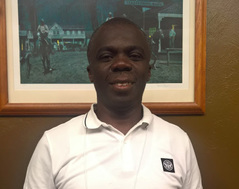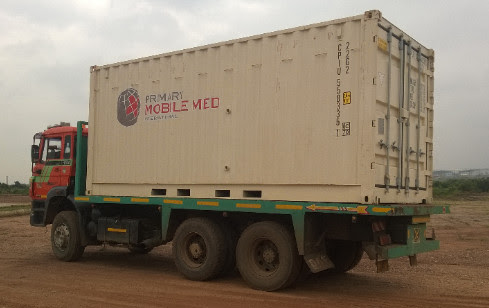When Delivering Health Care Globally, Experience MattersBehind every Primary Mobile Med International, PMMI, supporter there is a unique story that exemplifies dedication to global health. In our last newsletter, we covered how two of our supporters, Drs. Edward Fynn and Lewis Roberts, helped Tom and Kevin present PMMI’s work at this year’s Safari Five Conference. Because both Drs. Fynn and Roberts have firsthand experience providing health care to underprivileged populations and have been advising PMMI for the past few years, we are very thankful they helped us tell our story to conference attendants. We are excited to present Dr. Fynn:  Dr. Edward Fynn, currently living in Namibia, is a radiologist and senior lecturer at the Namibia School of Medicine. In addition to running a private radiology practice primarily dedicated to women's health, he also works with The Navigators to oversee humanitarian projects in Namibia and southern Angola. Dr. Fynn studied at the Ghana Medical School and completed postgraduate radiology training in South Africa. He has three children with his wife, Kate. Dr. Fynn took part in the following Q&A with PMMI: Q: Describe your reaction to seeing PMMI’s mobile medical clinic (MMC) in-person for the first time. A: When the container idea was pitched to me, I was very excited. But I was extremely excited when I got to walk into the container. I saw something that has been inspired and created by compassion, love, and need. It is amazing that the container and its equipment can meet 80% of the primary health care needs of any third-world country. The container is very relevant and will be very useful. Q: How can the container help you in your practice? A: Even though, in my practice, a lot of the radiology I do is with bigger machines, there are still many people I could help by providing outreach treatment with equipment that could fit in a shipping container, such as ultrasound and x-ray equipment. Providing access to an ultrasound would be especially helpful. Ultrasound diagnostics are critical for infant and maternal health. Q: Why are PMMI’s clinics an ideal solution for remote locations? A: The clinics will especially help practitioners who are in remote locations. The clinics help these practitioners get connected to central hubs and other medical professionals. This helps provide a more extensive diagnostic service to remote areas. Q: To what extent is Africa in need of primary health care? A: It is difficult to even estimate a level of need. It is even beyond the [African] government's ability to estimate. The government's lack the resources and funds needed to keep an accurate estimate. People are in great need. People have to walk miles to health care facilities. And sometimes when they get there, they might find there are no doctors, nurses, or medical supplies. Then they have to walk home untreated. For details about clinic sponsorship and employment opportunities for medical professionals please contact Eva Bammes, Director of Media and Marketing at [email protected]. For more information about PMMI, visit: www.primarymobilemed.com or join the mailing list for monthly updates: www.primarymobilemed.com/newsletter.
0 Comments
On a busy corner in Guadalajara, Mexico, the scent of fresh bread beckons pedestrians into a rustic bakery. Once inside, however, the pleasing aroma of Christ draws customers to the bakery's mother and daughter owner-operators, Myriam and Adriana Sanchez.
Rogenbrott was founded in 2014 as a missional enterprise to share Christ among the lost. The Sanchez family had a dream of starting a business where they could use their God-given talents as bakers, provide for their economic needs, and share Christ with others. That is what is happening as God is fulfilling their daily prayer of “Lord, let us be a fragrant scent here; may You be who attends to the true needs of our clients and providers.” The bakery sells homemade artisan bread to the community, and its impact is felt daily. Clients come in to purchase bread, and are charmed by the family who naturally shares Christ with them. Clients have learned that they can find a listening ear and someone who will pray for them. One client loves coming into the shop because she admires their peace and joy. When asked how they could always be so joyous, mom and daughter responded that it is Christ in them. The bakery's providers are also being reached with the Gospel. Over the past year, the Sanchez family has developed a relationship with one supplier. Although he comes from a religious family, he didn´t understand the Gospel. The Sanchez family believes in making Jesus known through their daily lives, so it wasn´t long before their provider asked them to pray for his sick relative. They rejoiced together when the relative was restored to health. After, their new friend began to come to them for counsel, and they began studying God´s Word with him. The Sanchezes hope that this is just the first of many who will come to know Jesus as their Savior because of the bread store dedicated to the Lord. The Gospel is being lived out in this bakery, and the pleasing aroma of Christ is fragrant to all. Will you take a moment and pray for this missional business, for the Sanchez family, and for other businesses serving to make Christ known around the world? “For we are the aroma of Christ to God among those who are being saved and among those who are perishing.” (2 Corinthians 2:15 ESV) – GEN Desk Contributing Author “Tom, you’re no longer strange to me.”
What in the world did Ivan, my close friend of two years, mean by that? My wife, our two middle-schoolers, and I had moved into a country that every national who had the chance was fleeing. Food was scarce. Utilities were sporadic. Unemployment was skyrocketing. Corruption was rampant. New criminal gangs were terrorizing the populace as they were fighting each other and carving out their territories. Our move from the suburbs of America to this collapsing country didn’t seem odd to me. It seemed more like an adventure to make a difference in the world by distributing humanitarian aid and leading bible studies with young adults who had never seen a Bible. I met Ivan and his wife on our first day in his country. They were both college graduates and were unemployed. I hired them as our language tutors, our interpreters, and our first employees. We shared life with them for hours on end for 5-6 days a week for two years. The bible studies seemed to be going well. Ivan was translating the materials from English into his native language. Using his artistic ability he also illustrated them with pen and ink drawings. Ivan was a new believer himself so our times in the Word were rich and special for him. I thought I was really connecting with Ivan, so what was that comment about me, “no longer being strange?” After our first 18 months in the country, I changed my focus from humanitarian aid to missional enterprise (BAM). As the enterprise grew we were able to employ more and more people. Job creation took the place of humanitarian handouts. Gainful employment restored dignity and removed the stigma of inferiority. The needs of our enterprise began to create auxiliary enterprises that provided employment for more people. This ripple effect of wealth creation made more sense to Ivan than our previous attempts of propping people up with bailouts. So why did Ivan think I was strange? When I asked him he gave me two reasons:
He also gave me two reasons why I was no longer strange to him:
It makes me wonder how many others have thought of me as strange when I thought I was just trying to help. - Missional Entrepreneur, GEN Desk Contributing Writer |
Categories
All
Archives
March 2020
|





 RSS Feed
RSS Feed
